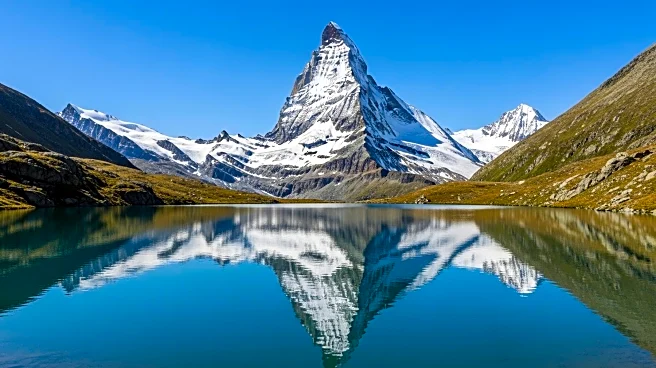What is the story about?
What's Happening?
Switzerland's glaciers have experienced a significant reduction in volume, with a 3% drop reported for 2025, marking the fourth-largest annual decline on record. This reduction is attributed to global warming, exacerbated by a particularly hot summer in Europe. The Swiss glacier monitoring group GLAMOS and the Swiss Academy of Sciences have reported that the ice mass in Switzerland has decreased by one-quarter over the past decade. The melting glaciers have implications for various sectors, including hydropower, tourism, and agriculture, as they affect water resources across Europe.
Why It's Important?
The rapid melting of Swiss glaciers is a stark indicator of the broader impacts of climate change, with significant consequences for environmental and economic stability. The loss of ice mass affects water availability, which is crucial for hydropower generation, a key energy source in Switzerland and other European countries. Additionally, the tourism industry, which relies on the scenic beauty of glaciers, may face challenges as these natural attractions diminish. The agricultural sector could also be impacted by changes in water supply, affecting crop yields and food security. The situation underscores the urgent need for global efforts to mitigate climate change and adapt to its effects.
What's Next?
In response to the ongoing glacier retreat, Swiss authorities and scientists may intensify monitoring efforts and implement measures to mitigate the impacts of climate change. This could include investing in renewable energy sources to reduce reliance on hydropower and developing strategies to support affected industries. International cooperation and policy initiatives aimed at reducing greenhouse gas emissions will be critical in addressing the root causes of glacier melting. The situation also highlights the importance of public awareness and education on climate change and its effects on natural resources.
Beyond the Headlines
The melting of Swiss glaciers raises ethical and cultural questions about the preservation of natural heritage and the responsibility of current generations to future ones. As glaciers retreat, there may be shifts in the landscape, leading to changes in ecosystems and biodiversity. The situation also prompts discussions on the role of human activity in accelerating climate change and the need for sustainable practices. Long-term, the loss of glaciers could alter the cultural and historical identity of regions that have been shaped by these natural formations for centuries.
















